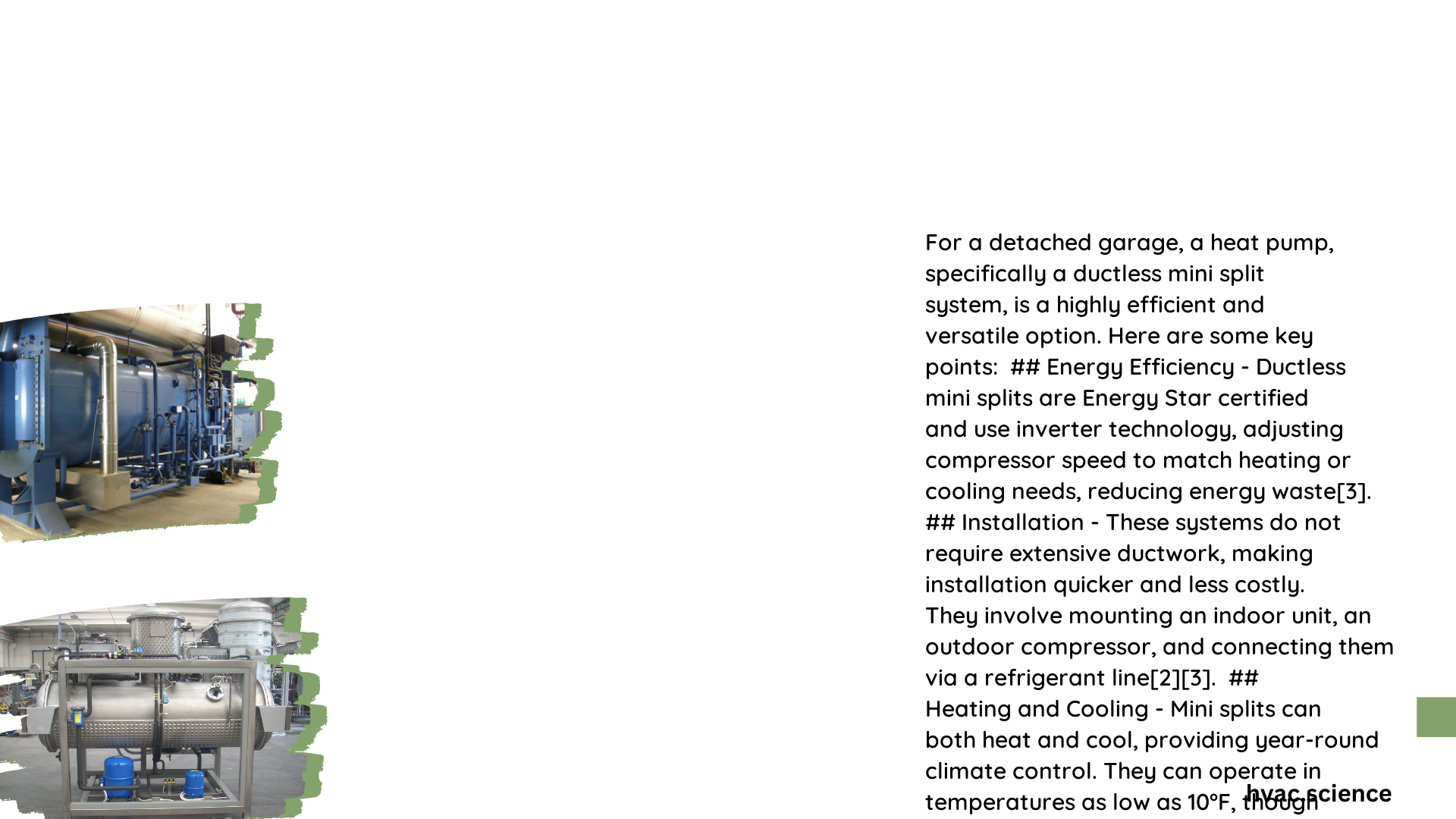A heat pump for detached garage is an efficient solution for year-round climate control. It provides both heating and cooling capabilities, making it ideal for workshops, storage spaces, or converted living areas. This comprehensive guide covers installation requirements, best practices, recommended brands, sizing calculations, and cost considerations for implementing a heat pump system in your detached garage.
What Are the Specific Installation Requirements for a Heat Pump in a Detached Garage?
Installing a heat pump in a detached garage requires careful planning and adherence to specific guidelines:
- Clearance:
- Minimum 10 inches from side structures
-
At least 60 inches clearance from the top
-
Elevation:
-
Raise the unit about 12 inches off the ground in snowy areas
-
Electrical Specifications:
- Proper electrical supply connection
-
Conduit for connecting indoor and outdoor units (for ductless mini-splits)
-
Insulation:
- Insulate walls, ceiling, and garage door
- Use materials like fiberglass rolls, EPS, or Polyiso
Best Practices for Installation
- Mount air handling units near the ceiling for space efficiency
- Implement regular filter maintenance, especially in dusty environments
- Check local building codes and HOA rules for any restrictions
Which Heat Pump Brands Are Best for Detached Garage Applications?

Several reputable brands offer heat pumps suitable for detached garages:
- Mitsubishi
- High SEER ratings (up to 24.5)
- 5-10 year warranty
-
Known for energy efficiency and quiet operation
-
Fujitsu
- SEER ratings typically above 18
- 5-10 year warranty
-
Positive user reviews for reliability
-
Daikin
- Comparable SEER ratings to competitors
- Similar warranty terms
-
Praised for ease of use
-
LG
- High-efficiency models available
- Competitive warranty offerings
- Well-regarded for performance in various climates
How Do You Calculate the Appropriate Heat Pump Size for a Detached Garage?
Determining the correct heat pump size involves considering several factors:
- Garage Dimensions:
-
Length, width, and height measurements
-
Insulation Quality:
-
Better insulation allows for smaller heat pump units
-
Local Climate:
-
Consider both heating and cooling needs based on your location
-
Desired Temperature Range:
- Your comfort preferences affect sizing requirements
Sizing Calculation Example
| Garage Size | Insulation | Climate | Recommended Size |
|---|---|---|---|
| 21×18 ft, 12 ft ceiling | Well-insulated | Moderate | 1.5-ton heat pump |
Note: Always use a professional load calculation tool or consult an HVAC expert for precise sizing.
What Are the Estimated Costs and Energy Savings for a Detached Garage Heat Pump?
Installation Costs
- Equipment:
-
Ductless mini-split systems: $1,000 – $3,000+
-
Labor:
-
Installation fees: $500 – $2,000
-
Additional Materials:
- Insulation, electrical supplies, structural adjustments (varies)
Energy Savings
- High-efficiency heat pumps can reduce energy consumption by up to 30% compared to traditional HVAC systems
- Potential tax credits of 30% (up to $2,000) for qualifying energy-efficient installations
How Does a Heat Pump Benefit a Detached Garage?
- Year-round Climate Control:
-
Provides both heating and cooling capabilities
-
Energy Efficiency:
-
Lower operating costs compared to separate heating and cooling units
-
Space Saving:
-
Compact design, especially with ductless mini-split options
-
Versatility:
-
Ideal for various garage uses (workshop, storage, living space)
-
Improved Air Quality:
- Filters and circulates air, reducing dust and humidity
What Maintenance Is Required for a Detached Garage Heat Pump?
Regular maintenance ensures optimal performance and longevity:
- Filter Cleaning/Replacement:
- Monthly during heavy use periods
-
Every 3 months for normal use
-
Coil Cleaning:
-
Annually for both indoor and outdoor units
-
Refrigerant Level Check:
-
Annually by a professional technician
-
Ductwork Inspection (if applicable):
-
Every 3-5 years for leaks or damage
-
Thermostat Calibration:
- Annually to ensure accurate temperature control
How Can You Maximize the Efficiency of Your Detached Garage Heat Pump?
Implement these strategies to optimize your heat pump’s performance:
- Proper Insulation:
-
Ensure walls, ceiling, and garage door are well-insulated
-
Weatherstripping:
-
Seal gaps around windows and doors to prevent air leaks
-
Programmable Thermostat:
-
Set temperature schedules to reduce energy use when the garage is unoccupied
-
Regular Maintenance:
-
Follow the manufacturer’s recommended maintenance schedule
-
Zoning:
- Consider a multi-zone system for larger garages or varied temperature needs
By following these guidelines, you can effectively install and maintain a heat pump for your detached garage, ensuring comfortable temperatures year-round while maximizing energy efficiency.
References:
1. HVAC-Talk: Need advice on HVAC for detached garage/workshop
2. TurboTax: I’m interested in installing a heat pump (mini-split) for our garage …
3. Grove HVAC: What’s the Best Way to Heat a Detached Garage?
